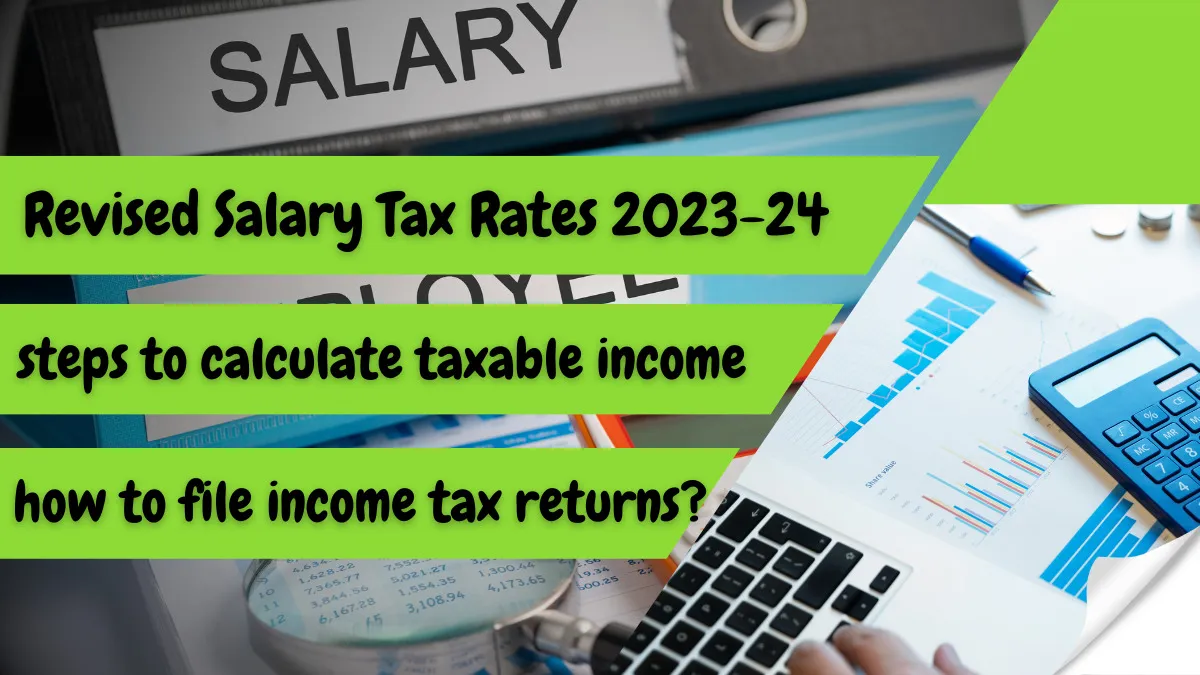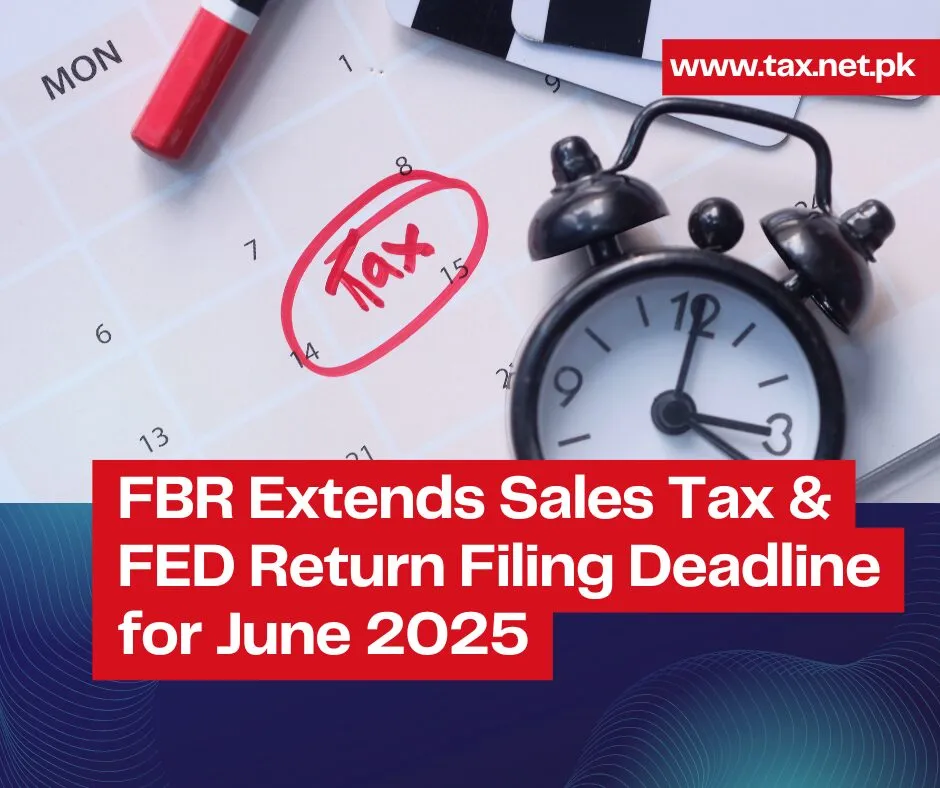Salary Tax Calculator 2023-24 Pakistan
Salary Tax Calculator 2023-24 Pakistan. Here we will explain to you all about tax on salary income along with tax credits, tax reductions, and deductible allowances. Revised tax on salary has also been given here for the tax year 2024 which is applicable from 1st July 2023.
Moreover, along with the revised tax rates on salary the following shall also be discussed:
- Importance of understanding salary taxes in Pakistan
- Pakistan Tax System Overview
- Step-by-step procedure to Calculate Taxable Income?
- How to file income tax returns in Pakistan?
- When tax returns are due and last date of filing a tax return?
- How income tax returns can be filed accurately and correctly?
- Revised Income Tax Rates of Salary for the tax year 2024
- Tax Rates on Salary for the tax year 2023 / Old tax rates on salary income
Importance of understanding salary taxes in Pakistan
We need to understand salary tax rates and how to calculate them because it impacts individuals’ financial planning. Every salaried individual needs to know what monthly tax will be deducted from his salary income.
He also wants to understand how to calculate tax on salary so as to do compliance with tax regulations in Pakistan. Especially, while filing of annual income tax returns he should know that his employer has deducted accurate tax on his salary.
Pakistan Tax System Overview
Here in Pakistan different types of taxes are charged. These taxes may include income tax, sales tax, property tax, customs duty, and excise duty.
In Pakistan, there is a progressive tax system. It means that tax rates increase with higher income levels and less taxes where the income level is low. So, individuals and corporations with high levels of income and wealth pay more taxes to equalize the distribution of wealth in the country.
In the recent budget for the tax year 2024, changes have been approved in the income tax rates on salary. The revised rates of tax on salary have been given here which will be applicable from 1st July 2023.
How to Calculate Taxable Income?
There are the following sources of income as explained in the income tax ordinance 2001:
- Income from Salary
- Income from Rent on Property
- Income from Business
- Income from other sources of income
- Income from Foreign Sources of Income
- Agriculture Income
- Capital Gains
As we are discussing salary income today here then it can be divided into the following:
- Salary Income
- Pay, Wages, or Other Remuneration (including Arrears of Salary)
- Allowances (including Flying / Submarine Allowance)
- Expenditure Reimbursement
- Value of Perquisites (including Transport Monetization for Government Servants)
- Profits in Lieu of or in addition to Pay, Wages, or Other Remuneration (including Employment Termination Benefits)
- Bonus against salary
- Any other allowance against the salary
Medical allowance up to 10% of basic salary is an allowable deduction from gross salary income when we calculate taxable income.
There are some allowable deductions and exemptions available to taxpayers, such as deductions for medical expenses, charitable contributions, and others. Let us see the list one by one.
Deductible Allowances:
- Zakat u/s 60
- Workers Welfare Fund u/s 60A
- Profit on Debt etc. u/s 60C
- Educational Expenses u/s 60D
Tax Reductions:
- Tax Reduction for Full Time Teacher / Researcher (Except teachers of medical professions who derive income from private medical practice)
- Tax Reduction on Tax Charged on Behbood Certificates / Pensioner’s Benefit Account in excess of the applicable rate
- Tax Reduction on Capital Gain on Immovable Property under clause (9A), Part III, Second Schedule for Ex-Servicemen and serving personnel of Armed Forces and ex-employees and serving personnel of Federal & Provincial Government @50%
- Tax Reduction on Capital Gain on Immovable Property under clause (9A), Part III, Second Schedule for Ex-Servicemen and serving personnel of Armed Forces and ex-employees and serving personnel of Federal & Provincial Government @75%
Tax Credits:
- Tax Credit for Charitable Donations u/s 61
- Tax Credit for Investment in Shares, Sukkuks, and Life Insurance Premium u/s 62
- Tax Credit for Investment in Health Insurance u/s 62A
- Tax Credit for Contribution to Approved Pension Fund u/s 63
- Tax credit u/s 64D for POS machine
- Tax Credit for Certain Persons (Coal Mining Projects, Startups, IT/IT enabled Services) u/s 65F
- Investment Tax Credit for Specified industrial undertaking u/s 65G
- Tax credit u/s 65G specified Industrial Undertakings
- Tax Credit u/s 103
- Tax Credit for Tax Paid on Share Income from AOP
- Tax credit for Charitable Organizations u/s 100C
- Surrender of Tax Credit on Investments in Shares disposed of before the time limit
- Tax Credit for Charitable Donations u/s 61 where the donation is made to associate
Adjustable Taxes:
There is also a list of advance income taxes (which are adjustable taxes):
- Import u/s 148
- Salary of Employees u/s 149
- Profit on Debt u/s 151
- Payment for Goods, Services, Contracts, Rent, etc. to a Non-Resident u/s 152(2)
- Profit on Debt to a Non-Resident u/s 152(2)
- Payment for Goods u/s 153(1)(a)
- Payment of Royalty to Resident Persons u/s 153B
- Rent of Immoveable Property u/s 155
- Cash Withdrawal from Bank u/s 231A
- Certain Banking Transactions u/s 231AA
- Motor Vehicle Registration Fee u/s 231B(1)
- Motor Vehicle Transfer Fee u/s 231B(2)
- Motor Vehicle Sale u/s 231B(3)
- Motor Vehicle Leasing u/s 231B(1A)
- Margin Financing, Margin Trading or Securities Lending u/s 233AA
- Goods, Passenger, Public Transport Vehicle Tax u/s 234
- Electricity Bill of Commercial / Industrial Consumer/domestic u/s 235
- Telephone/cellphone/internet Bill u/s 236
- Purchase by Auction u/s 236A (including renewal of license)
- Sale / Transfer of Immovable Property u/s 236C
- Advance Tax on Functions and Gatherings u/s 236D
- Purchase of other commodities by Distributors / Dealers / Wholesalers u/s 236G
- Purchase of Fertilizer by Distributors / Dealers / Wholesalers u/s 236G
- Purchase by Retailers/other retailers u/s 236H
- Purchase / Transfer of Immovable Property u/s 236K
- Banking transactions otherwise than through cash u/s 236P
- Advance tax on extraction of minerals u/s 236V
- Adjustments under 236A for Builders/Developers
- Adjustments under 236K for Builders/Developers
- Advance tax on On-Money u/s 231B(2A)
- Advance Tax on Withdrawal of Balance under Pension Fund u/c 23A of Part I of Second Schedule
- Persons remitting amount abroad through credit/debits / prepaid cards u/s 236Y
List of Final, Fixed, Minimum, and Reduced Tax
Following is the list of taxes paid/deducted from tax liability as final, fixed, minimum, and reduced rate of tax:
- Tax on Import under section 148
- Tax on Dividend u/s 150
- Payment for Specified Services to a Permanent Establishment of a Non-Resident u/s 152(2A)(b) / Division II, Part III, 1st Schedule
- Return on Investment in Sukuks u/s 151(1A)
- Return on investment in Sukuks to a Non-Resident u/s 152(1DB
- Royalty / Fee for Technical Services to a Non-Resident u/s 152(1) / Division IV, Part I, 1st Schedule
- Payment for Contracts for Construction, Assembly, or Installation to a Non-Resident u/s 152(1A)(a) / Division II, Part III, 1st Schedule
- Profit on Debt u/s 151
- Payment for Services, Contracts to a Non-Resident u/s 152(1A)(b) / Division II, Part III, 1st Schedule
- Fee for Advertisement Services to a Non-Resident u/s 152(1A)(c) / Division II, Part III, 1st Schedule
- Insurance / Reinsurance Premium to a Non-Resident u/s 152(1AA) / Division II, Part III, 1st Schedule
- Payment for Goods u/s 153(1)(a)
- Payment for Services u/s 153(1)(b)
- Receipts from Contracts u/s 153(1)(c)
- Fee for Export-related Services u/s 153(2)
- Export Proceeds u/s 154(1)
- Foreign Indenting Commission u/s 154(2)
- Sale Proceeds of goods to exporter u/s 154(3)
- Export Proceeds u/s 154(3C)
- Prize on Prize Bond u/s 156
- Brokerage / Commission u/s 233
- CNG Station Gas Bill u/s 234A
- The tax collected u/s 235 from the CNG station
- Electricity Bill of Commercial Consumer u/s 235
- Capital Gains on Immovable Property u/s 37
- Average Rate of tax for Calculation of employment termination benefits (0% To 100%)
- Average Rate of tax for Calculation of salary arrears (0% To 100%)
- Export of Services u/s 154A
- No. of Episodes of foreign-produced TV drama serial or play u/s 236CA (1)
Step-by-step procedure to Calculate Taxable Income?
While computing taxable income and tax payable there for the tax year under different sources of income, one should consider the following factors:
- One Should take all the sources of income, including salary, bonuses, allowances, other sources of income, business income, income from rent from property, Capital Gains, Foreign Source Income, and Agriculture Income.
- Separate each source of income into separate blocks of income, final tax, minimum tax, and normal tax regime.
- now take the impact of the allowable deductions and exemptions available to taxpayers, such as deductions for medical expenses, charitable contributions, and others (already given above).
- make adjustments of admissible and non-admissible tax deductions from total income to reach taxable income (like payment of taxes, accounting depreciation, and tax depreciation, lease rentals, etc)
- Take adjustment of tax credits, deductible allowances, and tax reductions (already given above)
- Adjust the advance income tax and final tax already paid and deducted
- If tax deductions/payments of both advance tax and final tax are more than the tax liability, then the remaining is the income tax refunds. If tax liability is more than then the tax deductions and payments, then the balance amount is required to pay along with the filing of the tax return.
- If there is a tax liability, then firstly it should have to pay after the preparation of the tax challan, and then the tax return will be submitted.
How to file income tax returns in Pakistan?
The following documents are required for the preparation of financials (working) for filing the tax return.
Documents required for a salaried person
The following list of papers and documents are required for a salaried person:
- Tax Deduction Certificate from the employer for a particular tax year (say the tax year 2022 – for the period from 1st July 2021 to 30th June 2022) under rule 42 of Income Tax Rules 2002.
- All Bank Account Statement for a particular tax year (say tax year 2022 – 01st July 2021 till 30th June 2022)
- Any other Tax Deduction Certificates and tax challans (Like, from the bank on banking profits of deposit, Purchase of vehicles, purchase/sale of property, tax on mobile, telephone, and internet usage)
- List of Personal Assets (property, vehicles, investments) along with their Value of Purchase/purchase date, particulars, and taxes paid, acquired within the tax year of return.
- List of assets (property, vehicles, investments) along with their Value of Purchase/purchase date, acquired in previous years (if the taxpayer is going to submit a tax return the first time).
- Any Bank loan and other liabilities from Individuals if any within the tax year or any balance carried forward from previous tax years (if the taxpayer is going to submit a tax return the first time).
- Utility bill if under the name of tax filer within the tax year
- Withholding tax certificate on kids’ educational expense / Mobile tax / Vehicle / Property etc.
- Detail/evidence of any Foreign Remittances received during the year.
- Evidence of any other source of income
- Detail of any assets sold/disposed of during the year (Sale / Encashment value, date of disposal, any taxes paid, particulars of assets).
- Advance Tax deducted by Saving Centre for a particular tax year
- Foreign remittance certificate/evidence for a particular tax year
Documents required for Sole Proprietors, Freelancer, Self-employed, and Business Individuals
Documents are required for Sole Proprietors, FreeLancer, Self-employed, and Business Individuals to prepare to work for the submission and filing of Income tax returns:
- Tax Deduction Certificate on supplies of goods from Companies/banks / third parties, in case of the tax deduction for a particular tax year (the tax year 2022 – 01st July 2021 till 30th June 2022)
- Summary of net sales invoices for a particular tax year (tax year 2022 – 01st July 2021 till 30th June 2022)
- Summary of expenses in business for a particular tax year
- Bank Statement for a particular tax year (for Tax Year 2022 Tax Returns: From 1st July 2021 to 30th June 2022).
- Detail of Business Assets as of 30th June 2021 and list of assets/investments/vehicles purchased or sold during the tax year (from 1st July 2021 to 30th June 2022).
- List of Personal Assets as of 30th June 2022 and list of assets/investments/vehicles purchased or sold during the tax year (from 1st July 2021 to 30th June 2022).
- Utility bill under the name of the business or tax filer/taxpayer.
- Advance Tax deducted by Saving Centre for a particular tax year
- Foreign remittance certificate/evidence for a particular tax year
- Any other Advance tax paid/deducted during the year.
- Books of accounts (if any).
- Financial statements (if any).
When tax returns are due and last date for filing a tax return?
Every year filing of tax returns becomes due after the end of the financial year (which starts on 1st July and ends on 30th June).
For instance, for the tax return of tax year 2023, the filing has started from 1st July 2023.
- The last date for filing the tax returns of an individual, Partnership business, and salaried taxpayer is 30th September 2023 (ay for the tax year 2023).
- For a private and public limited company last date to file a tax return is 31st December 2023 (say for tax year 2023).
How income tax returns can be filed accurately and correctly?
For proper submission of the tax return, you should consider the following:
- Take all relevant documents from the taxpayer
- Prepare all working necessary for the preparation of financials
- Now prepare financial statements (balance sheet, profit & loss A/C for businesses, and Wealth Statement and reconciliation statement for other than businesses)
- Prepare computation of taxable income and tax payable thereon for the relevant tax year
- Now pay tax if there is tax liability with the tax return
- Upload the data on an online draft of the tax return available on the portal of tax authority (like FBR in Pakistan)
- After payment of tax payable, now attach payment, verify, and then submit the tax return
Revised Income Tax Rates of Salary for the tax year 2024
After approval of budget proposals vide office memorandum issued on 26th June 2023 it has been revealed that tax on salary income has been amended for the tax year 2024. These new tax rates will be applicable from 1st July 2023.
Under the category of ‘salary’ where salary income exceeds seventy-five percent of their total taxable income, the following tax rates will be applicable:
01. If taxable income is up to Rs600,000: then the tax rate shall be zero percent.
02. where taxable income exceeds Rs600,000 but not exceeding Rs1,200,000: then the tax rate shall be 2.5 percent of the amount exceeding Rs600,000.
03. If taxable income exceeding Rs1,200,000 but not exceeding Rs2,400,000: then a fixed amount of Rs15,000, plus 12.5 percent of the amount exceeding Rs1,200,000, shall be applicable tax rate.
04. where taxable income exceeding Rs2,400,000 but not exceeding Rs3,600,000: then a fixed amount of Rs165,000, plus 22.5 percent of the amount exceeding Rs2,400,000, shall be applicable as a tax on salary income.
05. Moreover, if taxable income exceeding Rs3,600,000 but not exceeding Rs6,000,000: A fixed tax amount of tax of Rs435,000, plus 27.5 percent of the amount exceeding Rs3,600,000, shall be charged.
06. and if taxable income exceeding Rs6,000,000: then a fixed tax amount of Rs1,095,000, plus 35 percent of the amount exceeding Rs6,000,000, shall be charged.
Tax Rates on Salary for the tax year 2023 / Old tax rates on salary income
To avoid any doubt, income tax rates for salaried individuals is also given here for the tax year 2023:
01. Up to salary income of Rs600,000 tax rates is 0%
02. Where salary income is from Rs600,001 to 1,200,000 then the rate of income tax is 2.5% of the amount exceeding Rs600,000
03. if salary income is from Rs1,200,001 to 2,400,000 then rate of tax is Rs15,000 (fixed) plus 12.5% of the amount exceeding Rs1,200,000
04. if salary income is from Rs2,400,001 to 3,600,000 then rate of tax will be Rs165,000 (fixed) plus 20% of the amount exceeding Rs2,400,000
05. where salary income is from Rs3,600,001 to 6,000,000 then tax rate is Rs405,000 (fixed) plus 25% of the amount exceeding Rs3,600,000
06. Moreover, if salary income is from Rs6,000,001 to 12,000,000 then the tax rate is Rs1,005,000 (fixed) plus 32.5% of the amount exceeding Rs6,000,000
07. Lastly, if the amount of salary income is exceeding Rs12,000,000 then the rate of tax will be Rs2,955,000 (fixed) plus 35% of the amount exceeding Rs12,000,000




